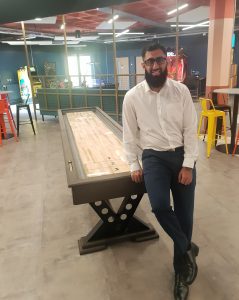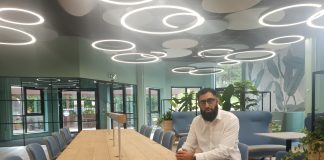“The UK’s youngest Student Union CEO” wants to see students accessing services via voice-activated AI portals and a range of commercial outlets on a 24/7 campus.
Aleem Bashir recently turned 31, making him “the youngest CEO of a students’ union” in the country. The father-of-two, who graduated from the University of Bradford with a BSc in Economics in 2015, before embarking on a Business Analysis Graduate Scheme with FDM Group, has a bold vision for the future.
But, as the saying goes, he has his work cut out for him.
“We’re still issuing cheques to students,” he muses while sitting in his office in front of a huge kanban board. “That means we have to spend time showing students how to bank them. There are a lot of processes that are still done on paper and it’s time consuming.”
Aleem, who cut his teeth digitising back-office processes for the Department for Work and Pensions (DWP), believes now is the right time to pull the University of Bradford Students’ Union – known as UBU – into the 21st Century.
Six months into the job and he’s already riding a wave of optimism, thanks in part to a £2m revamp of Student Central, formerly a somewhat past-its-prime hang-out that incidentally boasted the ‘longest student bar in the UK’. The bar selling alcohol has been dramatically reduced to accommodate new areas selling mocktails and bubble-tea, along with a game zone and a range of modern meeting and comfy relaxation spaces.
For Aleem, this is just the beginning of a long journey.
“The problem at the moment is, you pick one problem up and there are six more underneath, although that’s not necessarily a negative, because what we’re doing is finding things that have not been resolved and resolving them,” he said. “Six months in, my vision is still there to modernise the SU and bring it into the 21st century, finding cost effective ways to maximise the manner in which we engage with students, while keeping quality at the top.

“It is our aim to become financially more independent from the university. At the moment, we receive subvention [a grant] but we really need to start generating our own income. This will also improve the student offer. We need to start thinking about what that market looks like here on our campus, and we can then go from there and look at other things, such as the food offering and so on.”
But perhaps his biggest challenge will be to change the culture itself.
“At the moment, we have a website with bits of information in different places, whereas what we want is a one-stop shop with a user interface that cuts out people getting different messages from different departments,” he explained. “This is about centralising processes, for things like academic support, financial advice, exam extensions, general student support.
“At the moment, it feels almost as though we’re stuck in the 1960s. In my background, we were encouraged to use AI for everything, if you are not using AI, you are falling behind. You wouldn’t tell someone to not use a calculator to find cosign and tangent, whereas before calculators, people used to use books for that, so we need to embrace technology, including AI.

“I would like to see voice-activated information points with built-in AI, so students can approach them and simply ask a question, like ‘how do I get to the Alhambra?’ or ‘Where’s my next lecture?'”
Aleem knows all about overcoming obstacles. He grew up in a four-bed house in Bradford that was home to 15 people, all members of his extended family, with roughly four people to a room. One of his first actions as CEO was to ask everyone to share their Outlook calendars, to cut down on the time it takes to set up meetings.
Following his stint at DWP, Aleem went to work for software management providers Prometheus Group, whose clients include Shell, NASA, Bridgestone and Disney. His job was to show clients how to use software that took processes and automated them while ensuring the smooth running of the company.
“What I would like to see for the university and UBU is for them to be much more open in terms of how they operate, for services to be more accessible and for those services to be available outside the usual 9-5,” he said.




